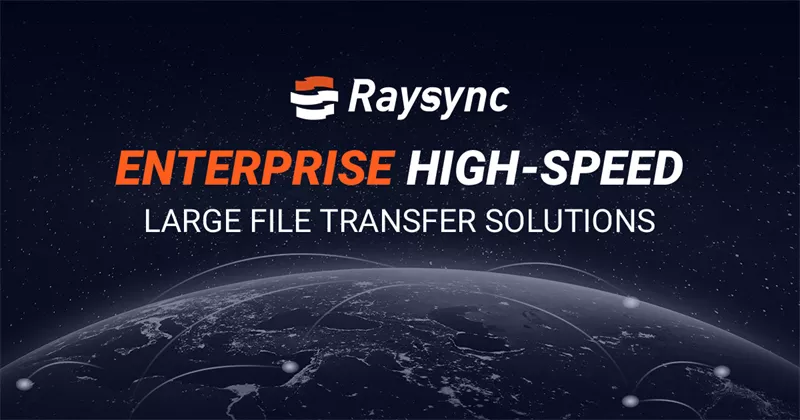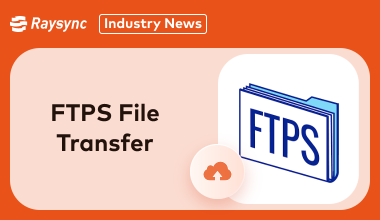Tutorial: How to Choose the Best Secure File Transfer
July 4, 2024In today's digital world, securely transferring sensitive files is crucial. Whether you're sharing confidential documents with colleagues, sending financial information to clients, or collaborating on creative projects, ensuring your data remains protected is paramount.

This guide empowers you to navigate the world of secure file transfer solutions and select the method that best suits your needs. We'll delve into the key factors to consider, explore different secure transfer protocols, and shed light on the role of encryption algorithms. By the end, you'll be equipped to make informed decisions and safeguard your data during every transfer.
Secure Encryption Algorithm Ranking for File Transfer
Have you ever wondered how secure file transfer tools keep your data safe? Here, we'll delve into the fascinating world of encryption algorithms, the secret guardians protecting your files during transfer. We'll explore different types of algorithms and the scenarios where they shine!
Here is the Secure Encryption Algorithms Ranking for File Transfer:
Tier 1: Highly Recommended
AES (Advanced Encryption Standard)
- Key Sizes: 128, 192, or 256 bits
- Scenario Example: Encrypting financial reports and client data being transferred between headquarters and branch offices. AES-256 is used for its high level of security and wide acceptance in regulatory standards.
ChaCha20-Poly1305
- Key Sizes: 256 bits
- Scenario Example: Transferring large volumes of transaction records to remote servers where hardware acceleration for AES is not available. ChaCha20-Poly1305 provides high security and better performance on mobile devices.
Tier 2: Strongly Recommended
RSA (Rivest-Shamir-Adleman)
- Key Sizes: 2048 bits and higher (recommended 3072 bits or more for long-term security)
- Scenario Example: Securely exchanging encryption keys with external partners before transferring sensitive financial models and client information. RSA ensures the keys are securely exchanged without interception.
ECDSA (Elliptic Curve Digital Signature Algorithm)
- Key Sizes: 256, 384, or 521 bits
- Scenario Example: Ensuring the authenticity and integrity of audit logs and compliance reports sent to regulatory bodies. ECDSA provides strong security with efficient performance.
ECDH (Elliptic Curve Diffie-Hellman)
- Key Sizes: 256, 384, or 521 bits
- Scenario Example: Establishing secure connections for real-time data transfers between financial analysts and the central database. ECDH allows secure key exchange over potentially insecure networks.
Tier 3: Recommended
Twofish
- Key Sizes: 128, 192, or 256 bits
- Scenario Example: Providing an alternative encryption method for internal communications within the firm, especially for sensitive R&D data. Twofish is chosen for its security and performance.
Blowfish
- Key Sizes: 32 to 448 bits
- Scenario Example: Protecting legacy systems' archived financial data during transfer between old and new storage solutions. Blowfish is used due to its historical reliability, although it's less common today.
Tier 4: Legacy Use
Triple DES (3DES)
- Key Sizes: 168 bits (effective security is 112 bits)
- Scenario Example: Securing file transfers for older banking systems that haven't been upgraded to more modern encryption algorithms. 3DES is used due to its previous industry-standard status.
How Encryption Algorithms Work in File Transfers
In the world of secure file transfers, encryption algorithms act like secret code machines, scrambling your data to make it unreadable to anyone who shouldn't see it. Here's a breakdown of how they work.
The Encryption Process:
- Imagine you have a confidential file to send. The encryption algorithm takes this file and your chosen secret key (like a password) as inputs.
- Think of the key as a special set of instructions. The algorithm uses this key to transform your file into a seemingly random jumble of data, often referred to as ciphertext. This ciphertext is unreadable without the key.
File Transfer with a Secure Tunnel:
- Secure file transfer protocols like SFTP and FTPS create a secure tunnel for the encrypted data to travel through. This tunnel is like a hidden pathway protected by strong encryption (like TLS/SSH) in these protocols.
Decryption at the Destination:
- Once the encrypted data reaches its destination, only the authorized recipient with the correct decryption key can unlock the secret message. The decryption process essentially reverses the encryption, using the key to turn the ciphertext back into the original file.
Types of Encryption Algorithms:
There are two main types of encryption algorithms used in file transfer:
- Symmetric Encryption: This is like using a single key to lock and unlock a door. Both the sender and receiver share the same secret key to encrypt and decrypt the data. AES-256 is a popular example, known for its speed and strength.
- Asymmetric Encryption: This is like having a lock with two keys: a public key (like a mailbox) and a private key (like your house key). Anyone can use the public key to encrypt data, but only the recipient with the private key can decrypt it. This is often used for secure communication and digital signatures, but not as commonly for bulk file transfers due to its slower processing speed.
How to Choose the Best Secure File Transfer Now
Selecting the right secure file transfer solution can immensely enhance your data security and workflow efficiency. Here are some main considerations to keep in mind when making your choice:
- Solid Encryption Standards: Ensure the solution uses strong encryption algorithms like AES-256 or RSA to protect your data.
- Important Features: Look for high-speed transfers, the ability to handle large files, and cross-platform compatibility.
- User-Friendly Interface: The solution should be easy to use and integrate smoothly with your existing workflows.
- Provider Reputation: Choose a provider with a strong reputation for reliability and excellent customer support.
- Cost-Effectiveness: Assess the pricing against your budget to ensure you get value for your money.
One of the trusted methods to transfer secure files is using Raysync. It is known for its high security and high-speed large file transfers, making it a dependable choice for many organizations.
High-Speed Large File Transfer with AES-256 Recommended - Raysync
Raysync is a high-speed file transfer solution designed to provide secure, efficient, and reliable file transfer capabilities. It is particularly well-suited for businesses that require the transfer of large files or large volumes of data, ensuring that transfers are completed quickly and securely.

Here are the key features of Raysync:
1. Security
- Encryption: Implements strong encryption standards such as AES-256 and SSL/TLS to ensure data is protected during transfer.
- Access Control: Provides granular access control, ensuring that only authorized users can access and transfer files.
2. High-Speed Transfer
- Optimized Protocol: Raysync utilizes an optimized file transfer protocol that significantly increases transfer speeds compared to traditional methods like FTP or HTTP.
- Bandwidth Utilization: Efficiently uses available bandwidth to maximize transfer speeds, reducing the time required for large file transfers.
3. Reliability
- Resume and Retry: Automatically resumes interrupted transfers and retries failed transfers, ensuring data is successfully transferred even in case of network issues.
- Data Integrity: Uses checksum verification to ensure the integrity of transferred files, preventing corruption or data loss.
FAQs about the Secure File Transfer
This section addresses frequently asked questions (FAQs) regarding secure file transfer methods. Here, you'll find clear and concise information to help you understand the process, choose the right solution, and ensure the safe transfer of your sensitive data.
1. What is the most secure file transfer?
The most secure file transfers typically involve encryption using robust algorithms like AES-256. Platforms that offer end-to-end encryption, secure protocols (such as SFTP, HTTPS), and multi-factor authentication (MFA) enhance security. Solutions like Raysync, leveraging AES-256 encryption, ensure data remains protected during transmission.
2. What is the secure way to transfer files?
Secure file transfer methods include using encrypted protocols (e.g., SFTP, FTPS), secure cloud storage services with TLS encryption, and dedicated file transfer solutions. Always encrypt files before sending, use strong passwords, and implement access controls to safeguard data integrity and confidentiality.
3. How can I send secure files for free?
Several free tools and methods can facilitate secure file transfers. Utilize platforms like Raysync, which encrypts files end-to-end and offers great protection. Alternatively, other cloud services with free tiers like Google Drive or Dropbox offer encrypted file uploads. You must always verify encryption standards and user security practices to ensure data safety.
Final Words
Choosing the right secure file transfer solution is crucial for protecting your sensitive data. By considering encryption standards, essential features, ease of use, provider reputation, and cost-effectiveness, you can ensure your data remains safe during transfer. Prioritize solutions like Raysync for high security and speed, and rest assured your data is in good hands.
You might also like

Industry news
September 19, 2024Discover everything about FTPS file transfer, how it works, top enterprise applications, and faster FTPS transfer alternatives like Raysync for secure and efficient data transfers.

Industry news
November 27, 2024Find the best fast file transfer software for PC free download! Discover tools for blazing-fast transfers, secure backups, and seamless data migration for individuals and businesses.

Industry news
October 23, 2024Explore the best WeTransfer alternatives for online file sharing and find a solution that meets your file transfer needs effectively.